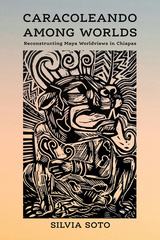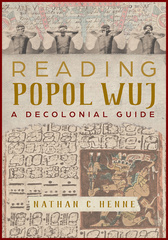
248 pages, 6 x 9
10 b&w illustrations
Paperback
Release Date:14 Jun 2022
ISBN:9780816548484
Unwriting Maya Literature
Ts'íib as Recorded Knowledge
By Paul M. Worley and Rita M. Palacios
The University of Arizona Press
Unwriting Maya Literature provides an important decolonial framework for reading Maya texts that builds on the work of Maya authors and intellectuals such as Q’anjob’al Gaspar Pedro González and Kaqchikel Irma Otzoy. Paul M. Worley and Rita M. Palacios privilege the Maya category ts’íib over constructions of the literary in order to reveal how Maya peoples themselves conceive of artistic creation. This offers a decolonial departure from theoretical approaches that remain situated within alphabetic Maya linguistic and literary creation.
As ts’íib refers to a broad range of artistic production from painted codices and textiles to works composed in Latin script as well as plastic arts, the authors argue that texts by contemporary Maya writers must be read as dialoguing with a multimodal Indigenous understanding of text. In other words, ts’íib is an alternative to understanding “writing” that does not stand in opposition to but rather fully encompasses alphabetic writing, placing it alongside and in dialogue with a number of other forms of recorded knowledge. This shift in focus allows for a critical reexamination of the role that weaving and bodily performance play in these literatures, as well as for a nuanced understanding of how Maya writers articulate decolonial Maya aesthetics in their works.
Unwriting Maya Literature places contemporary Maya literatures within a context situated in Indigenous ways of knowing and being. Through ts’íib, the authors propose an alternative to traditional analysis of Maya cultural production that allows critics, students, and admirers to respectfully interact with the texts and their authors. Unwriting Maya Literature offers critical praxis for understanding Mesoamerican works that encompass non-Western ways of reading and creating texts.
As ts’íib refers to a broad range of artistic production from painted codices and textiles to works composed in Latin script as well as plastic arts, the authors argue that texts by contemporary Maya writers must be read as dialoguing with a multimodal Indigenous understanding of text. In other words, ts’íib is an alternative to understanding “writing” that does not stand in opposition to but rather fully encompasses alphabetic writing, placing it alongside and in dialogue with a number of other forms of recorded knowledge. This shift in focus allows for a critical reexamination of the role that weaving and bodily performance play in these literatures, as well as for a nuanced understanding of how Maya writers articulate decolonial Maya aesthetics in their works.
Unwriting Maya Literature places contemporary Maya literatures within a context situated in Indigenous ways of knowing and being. Through ts’íib, the authors propose an alternative to traditional analysis of Maya cultural production that allows critics, students, and admirers to respectfully interact with the texts and their authors. Unwriting Maya Literature offers critical praxis for understanding Mesoamerican works that encompass non-Western ways of reading and creating texts.
'Worley and Palacios champion Maya cultural traditions and narratives, performing a scholarly, engaged activism that not only exemplifies ways in which to perform such work, but also highlights Maya creators’ political and social activism.'—Paula L. Karger, The Latin Americanist
'Unwriting Maya Literature indicate(s) that the area of indigenous literary studies is doing important work to change academia from the inside out.'—Julia Brown, Chasqui
'In Unwriting Maya Literature Paul M. Worley and Rita M. Palacios challenge the dominant methods in the study of literature of the pan‐Maya world and advance a decolonial model for understanding Maya cultural production.'—Sarah Alice Campbell, Bulletin of Latin American Research
‘This timely and groundbreaking book provides an important decolonial framework for the study of Maya and Indigenous texts.’ —Alicia Ivonne Estrada, California State University, Northridge
‘This book is an original contribution to Maya, Indigenous, Latin American, and literary studies. The authors produce generative readings and insightful analyses of Maya cultural productions—whether textiles or poetry—from across the Maya region, moving beyond nation-state borders.’—Gloria Elizabeth Chacón, University of California, San Diego
‘Without doubt, Worley and Palacios’s book makes critically key contributions to the fields of literary criticism and Native American and Indigenous studies. Its theoretical value and methodological approaches can also apply across multiple fields and disciplines. This book must be required for any scholar and student specializing in literature in general, as well as those specializing in Native American and Indigenous studies. This book is also suitable for any reader who wants to understand ts’íib as an alternative way of producing and recording art and knowledge from a Mayan artistic creative perspective.’—Jaime Pérez González, Native American and Indigenous Studies
Paul M. Worley is an associate professor of global literature at Western Carolina University. He is the author of Telling and Being Told: Storytelling and Cultural Control in Contemporary Yucatec Maya Literatures.
Rita M. Palacios is a professor of liberal studies at Conestoga College Institute of Technology and Advanced Learning in Kitchener, Ontario, Canada.
Rita M. Palacios is a professor of liberal studies at Conestoga College Institute of Technology and Advanced Learning in Kitchener, Ontario, Canada.













